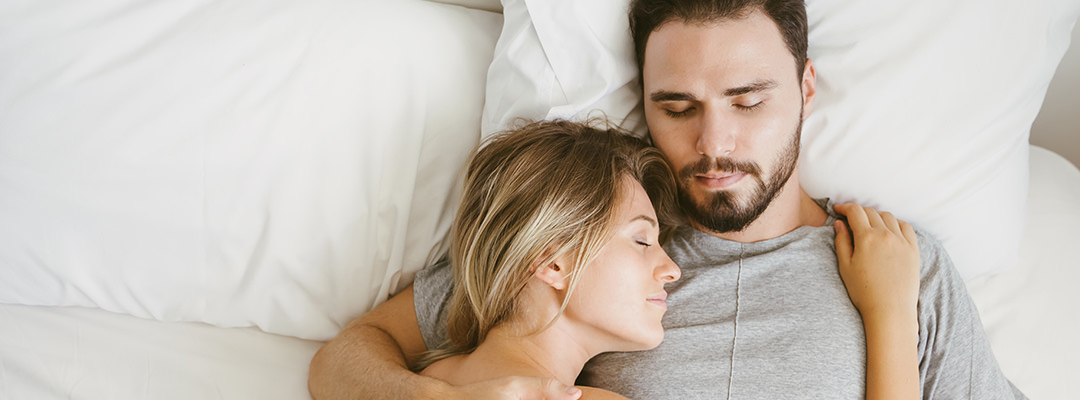It’s no secret that we all want a good night’s sleep. Whether we’re up late taking care of our families, working at demanding jobs, or spending quality time with friends, there’s nothing better than finally settling into a cozy bed for some rest and recuperation. But does physical exhaustion affect men and women in the same way? How does gender affect the way in which we take care of ourselves?
People have long tried to draw distinctions between men and women, the way our bodies behave, and what they need from us. Some of these have led to dangerous myths, while others — like how much sleep we need, and why — actually have some truth to them. Let’s explore how much sleep men and women need and how to get the best sleep possible for our bodies.
Do women need more sleep than men?
Surprisingly enough, yes! You may have heard that women need to sleep for longer at night than men do. But is this really true? Turns out, there are some good reasons for women to get more sleep than men, and they have to do with both environment and biology. Several studies, including one at Loughborough University’s Sleep Research Centre, have looked at the numerous factors that influence the sleep habits of men and women including lifestyle, hormone changes, neurobiology, and sleep disorders and learned that on average, women’s bodies require more sleep than men’s.
While there haven’t yet been sleep studies done on trans women or non-binary people, and there is certainly more room to explore the unique factors affecting men and women and their sleep health, we’ve seen that there is a commonality which shows that women need more sleep to stay healthy and safe in their day-to-day lives.
Why do women need more sleep than men?
Women need more sleep than men for a number of reasons, including demands on their bodies, higher susceptibility to sleep disorders, and the fundamental way their brains are built. Let’s explore some of these key factors that affect women and their need for sleep.
Busier lives
On average, women have more responsibilities in their daily lives than men do. Women have been proven to take on more unpaid labor at their jobs, in addition to a higher proportion of housework and taking care of their families. Despite our major strides in gender equality, there are unfortunately still societal expectations on women — sometimes unconscious ones — to achieve more with their time. Not only is this physically exhausting, but it often keeps women up later at night and rising earlier in the morning.
Hormonal shifts
As women age, they go through more shifts in their hormonal cycles than men do, including through experiences like menstruation, pregnancy, and menopause. Unlike men, whose bodies change at a relatively consistent rate, women’s bodies are in a constant state of flux. All of these changes have a negative effect on a woman’s circadian rhythm, making it harder to maintain a healthy sleep routine and to get a deep, healthy sleep. Plus, many of these hormone shifts can lead to or exacerbate illnesses like anxiety or depression, which can also have a hugely negative effect on our sleep health.
Increased risk of sleep disorders
Overall, women have been proven to be at higher risk for a range of sleep disorders. According to the National Sleep Foundation, about 15% of women regularly suffer from sleep disorders, compared to just 8% of men. Another study showed that women are 40% more likely to suffer from certain sleep disorders, such as insomnia, than men. This is likely due to a combination of factors including a lifestyle that doesn’t allow for as much rest and neurobiological causes such as the fact that women are more susceptible to suffering from mental illness than men are.
Their brains work harder
Women are born multi-taskers — an inherent skill set that has been both a blessing and a curse. Within society, women are often expected to be everywhere at once, balancing tasks and to-do lists with circus-like precision. This is truer than it’s ever been in our era of digital communication, where women are expected to be mothers, partners, leaders, teachers, friends, and single-handed support networks for a whole range of people at miraculously the same time. For this reason, women are actually using a greater percentage of their brains than men, and women’s brains are working a lot harder during an average day. Not only is this absolutely exhausting, but it doesn’t even fully stop while we’re asleep. For this reason, when women do sleep it’s usually lighter and less restorative than the way men sleep.
How much should women and men sleep?
Women and men both need a healthy night’s sleep to function at their best. Even though women need increased amounts of sleep at a dire level, men aren’t off the hook either — a healthy sleep rhythm is essential for everyone’s health, regardless of gender. Adults should aim for a minimum of seven and a half hours sleep every night — eight to nine hours is ideal. While sleep patterns can be influenced by a number of factors including lifestyle, surroundings, worries, and responsibilities, it’s generally thought that women need about a half-hour more sleep per night than men in order to function at their best. This means aiming for a minimum of eight hours each night.
Sometimes, though, women will need a lot more if they’re not able to get into a very deep sleep right away. Often our worries will keep us awake at night, or keep our minds churning in a semi-awake sleep stasis. This makes it feel like we’re getting our requisite eight hours, when really a portion of the sleep isn’t doing us all that much good. The bottom line? Aim for a healthy eight-hour sleep as often as possible, and try some of our tips and tricks below to get the most out of your sleep.
How to get a better sleep as a busy woman
With sleep health being so integral to how we function in our waking lives, we want to make the most out of the time that we have to devote to sleep. Here are a few things to keep in mind as you settle down for the night for some well-deserved rest.
Create a bedroom sanctuary
Your sleeping space should feel like a safe, welcoming place away from all the worries of the outside world. Whether you live alone or with a partner, try to make your bedroom somewhere you can embrace coming home to at the end of a long day. This might mean soft, cozy blankets, or candles and essential oils, or comforting books to read, or photos of loved ones — whatever feels safe and warm and uniquely you. Once you’re in this space, try to leave your stress and anxiety at the door until morning.
Maintain a consistent routine
Just like your bedroom is a sacred space, your bedtime is a sacred space in its own way too. Try to keep your bedtime routine consistent every day, winding down and going to sleep at the same time each night. See if you can come up with a comforting nighttime ritual that will signal to your brain and body that it’s time to leave your cares at the door. This might be something like curling up with a good book, playing a certain song that you associate with going to bed, or putting on a relaxing scent that you only wear to bed. Giving your brain little cues and maintaining them each time you go to bed will make it easier to slough off the day and settle into a deep, peaceful sleep.
Limit sleep-inhibiting substances
Things like caffeine, alcohol, and cigarettes might make the days’ dramas easier to deal with (in the short term), but they’re not doing you any favors when it comes to getting a good night’s sleep. These things inhibit your ability to fall asleep and to sleep deeply once you do. Try to limit your intake of things like coffee, caffeinated tea, wine, and cigarettes to at least six hours before you plan on going to sleep. That way your body will have time to recalibrate back to center by the time you go to sleep.
Turn off your phone
You’ve probably heard cautionary tales against using your electronic devices before bed — the blue light off your phones and ipads imitates natural daylight, and makes it harder for your body to kick into its natural sleep cycle. Plus, scrolling through work emails, political news, and unrealistic body images on Instagram is only going to make your stress and anxiety worse. For the best sleep possible, do your best to keep your phone out of reach at least one hour before you go to bed. Instead, use that time to relax, read, meditate, or spend quality time with your partner. Your body and your mind will thank you for it.
Practice gratitude
We’re all under a lot of stress from our professional lives, our own self-imposed pressures, and the world around us. Sometimes it can be hard to remember how much we have to be thankful for. One great way to de-stress and improve the quality of your sleep is to take a few minutes to check in with things that are going right. You can do this with a journal, an audio recording, or a simple conversation with a loved one. Try writing down three things each day that you’re grateful for before you go to bed, or three good moments that happened during the day. You’ll be amazed at how much we miss, and how easily, when we get bogged down by our lives. When you make an effort to be mindful of what’s good in your life, your worries won’t weigh you down so much at night and you’ll sleep easier.
Practice healthy sleep habits — no matter your gender
It’s true that women are having a tougher time with their sleep than men are, but pretty much everyone who has to get up in the morning and have a life can relate to not getting enough sleep. Whatever your gender, lifestyle, or schedule, making an effort to practice healthy sleep routines and awareness will improve your body, mind, and emotional well-being.
Did you like it?4.5/5 (28)





